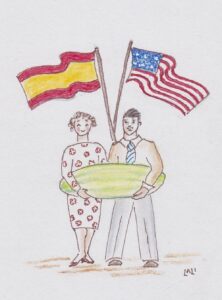Birmingham, Alabama, 1959. My parents are at the farmers’ market, buying a watermelon. They wander from stall to stall, searching for the round, basketball-sized watermelons like the ones that my mother’s father used to grow: deep green on the outside and crimson inside, sweet and flavorful with the concentrated resins of a dry Mediterranean summer. But the only watermelons on offer here are pale green, zeppelin-shaped, and enormous. In America, even fruit is larger than life.
They ask the vendor which watermelon might be the best. Hearing their accents, the man gives my parents a searching look.
“Are you folks from England?” he asks. Barely suppressing their mirth at being mistaken for Brits, my parents say “No. We are from Spain.”
“Ah,” the vendor says, comprehension dawning, “I knew there was something wrong with you.”
I hear the story as my parents stagger into the kitchen with the outsize watermelon, still laughing about their encounter with the farmer. Our lives in those years were full of episodes like the watermelon one. There was the time my mother bought a five-pound can of Crisco thinking that it contained the delicious-looking fried chicken legs and desserts pictured on the label. There was the look on the face of my straitlaced high school principal, Father H, when, at the end of our first meeting, my father, my mother, and I in turn seized his hand and kissed it. How were we to know that you don’t kiss priests’ hands in America?
After each of these culture clashes my parents’ reaction is not humiliation or resentment, but gales of laughter at themselves and at the quirks and peculiarities of “these Americans.” They are not offended when people assume that, because we speak Spanish, we have everything in common with the inhabitants of the nations south of the border, from the Rio Grande to Tierra del Fuego. They take it in stride when people are shocked to hear that they do not attend bullfights or play the guitar. They do not feel insulted when they have to explain over and over that Catalan, our native tongue, is not a dialect of Spanish.
“These Americans,” they say, shaking their heads “the rest of the world doesn’t exist for them.”
On the other hand, my parents find much to admire in their new country. “These Americans are so practical!” my mother exclaims, “they have invented paper napkins, which you never have to wash.” She thinks that American women are extraordinary. “They always look so perfect, as if they have just come out of the beauty salon. And they are brave: they all know how to drive, and some even drive trucks!”
As a teenager, I am less forgiving than my parents, and I often complain of feeling like an illustration on a travel poster, instead of being seen for myself (but travel posters have their uses, especially as attention-getting devices). I lack my parents’ sense of self-irony, and the imagination to put myself in the place of the watermelon seller and his fellow citizens, who don’t quite know what to make of us.
In retrospect, I find it remarkable that my parents never felt disrespected or discriminated against. The did not resent being treated as foreigners. They did not complain to my school because I wasn’t offered instruction in English as a second language. They expected Americans to continue being Americans, just as they would continue being Spaniards. While they were willing to make whatever adjustments were demanded by courtesy towards the host country and by their minority status, assimilation into the “melting pot” was never their goal. “We are not carrots,” my father said, “to be put into a soup.”
Some of their attitude was sheer stubbornness, and some was a bit of a European superiority complex. And some of it was because, although we had come as immigrants looking for more opportunity, we came as a cohort of three, as opposed to three million, and although we were considered odd, we were never seen as members of a class, a wave, or an invasion to be guarded against and oppressed.
When they finally stop laughing about the farmers’ market incident, my parents cut open the watermelon. Their faces fall as they see that, instead of blood-red, the flesh is an anemic pink, and the first bite reveals its watery, barely-there flavor, diluted by the semi-tropical rains of Dixie.
“These Americans,” my parents conclude, disappointed, “they can send rockets into space, but they don’t know very much about watermelons.”



4 Responses
I remember the Crisco story from our old days. have always loved it.
There is nothing like old friends to keep the past alive!
New system, eh? Leaving a comment to see if it will stick.
Thanks for helping baptize the new platform, Alicia. It’s been quite a process, but I’m glad it’s working.